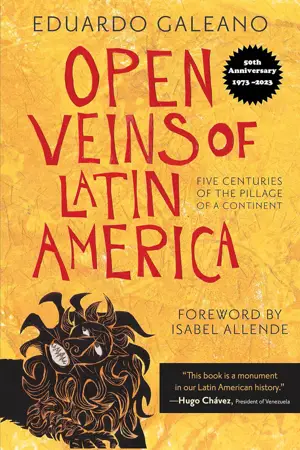Open Veins of Latin America

Historical Context
Galeano begins with the arrival of Christopher Columbus in 1492, marking the start of a relentless exploitation of Latin America's resources. He details how European powers, driven by greed, sought to extract wealth from the continent. The initial focus was on gold and silver, which led to the brutal subjugation of indigenous populations. The Spanish crown and other European powers established systems that prioritized the extraction of resources over the wellbeing of the local people.
Colonial Exploitation
Throughout the colonial period, Galeano illustrates how the exploitation of natural resources—minerals, agricultural products, and human labor—shaped the economies of Latin American countries. He highlights the inhumane treatment of indigenous peoples and enslaved Africans, emphasizing the moral and ethical implications of this exploitation. The narrative underscores that the wealth generated from these resources primarily benefited foreign powers and a small local elite, while the majority of the population remained impoverished.
Economic Dependence
Galeano argues that the economic structures established during colonial times laid the groundwork for ongoing dependency. He discusses the role of foreign investment and multinational corporations in perpetuating this cycle of exploitation. Even after gaining independence in the 19th century, many Latin American nations found themselves in a neocolonial relationship with Western powers, reliant on foreign capital and technology. This dependency stifled local development and maintained inequality.
The Role of Agriculture
The book also delves into the agricultural sector, noting how cash crops like sugar, coffee, and bananas were cultivated for export rather than local consumption. Galeano critiques the concentration of land ownership, which marginalized small farmers and indigenous communities. This focus on monoculture not only harmed local economies but also led to environmental degradation, as diverse ecosystems were replaced by single-crop plantations.
Political Turmoil
Galeano examines the political landscape of Latin America, characterized by dictatorships, coups, and foreign intervention. He highlights the complicity of the United States in supporting authoritarian regimes that served American interests, often at the expense of democratic movements and social justice. Through vivid anecdotes and historical examples, he illustrates how political repression was used to maintain the status quo and suppress dissent.
Cultural Impact
In addition to economic and political issues, Open Veins addresses the cultural ramifications of colonization and exploitation. Galeano discusses how the identities of Latin American peoples have been shaped by a history of oppression and resistance. He emphasizes the importance of understanding this history to reclaim cultural heritage and foster a sense of agency among marginalized communities.
Resistance and Hope
Despite the grim realities presented in the book, Galeano also highlights acts of resistance and resilience throughout Latin American history. He showcases the struggles of indigenous peoples, labor movements, and social justice activists who have fought against oppression. These narratives serve as a reminder that, while the continent has faced significant challenges, there is a rich tradition of resistance and a longing for social and economic justice.